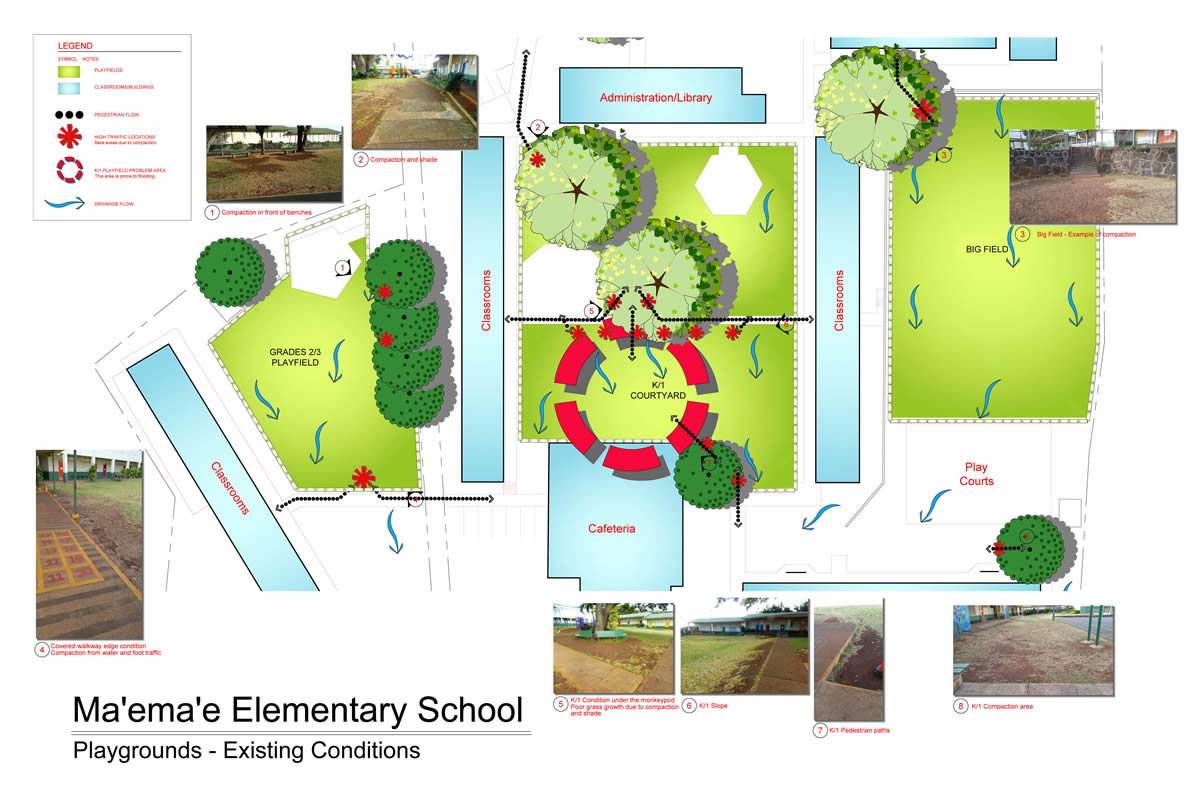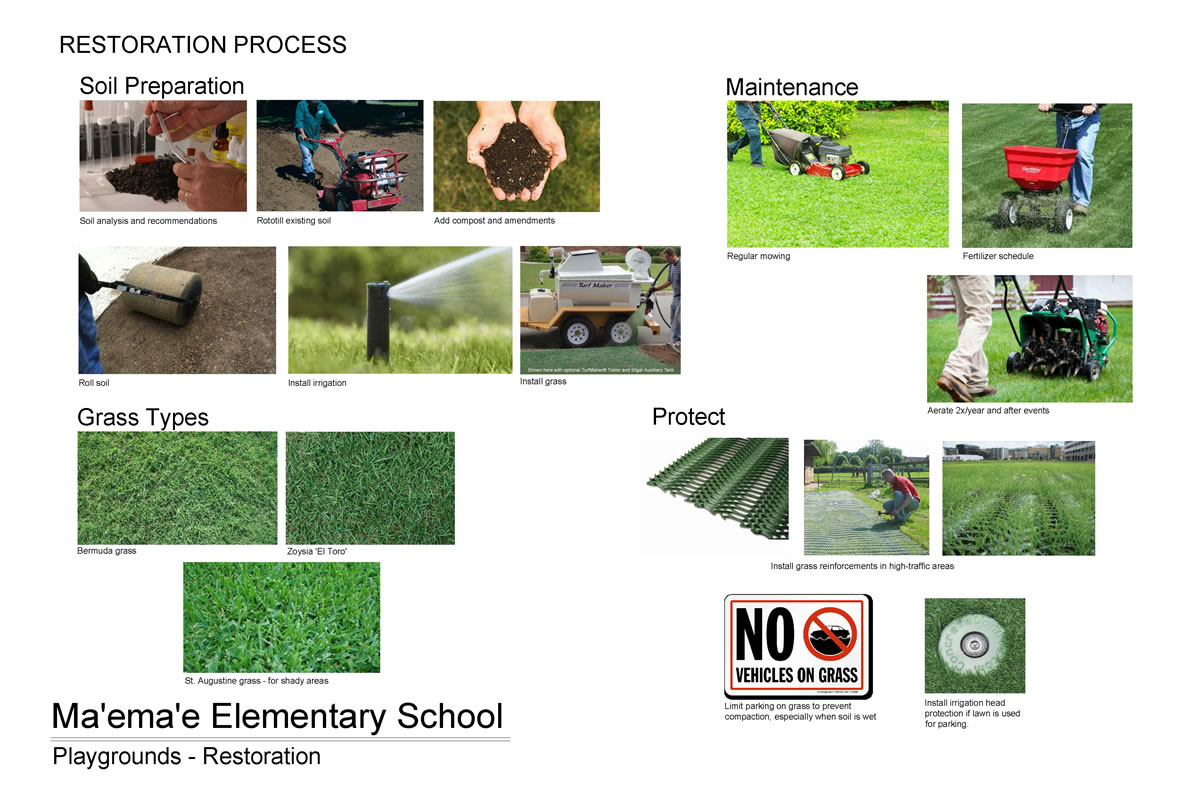Projects
Ma’ema’e School & Community Foundation Projects
UPDATE: Gr. 2/3 Playground Renovation Phase I Completed
YEAR
GOAL
OUTCOME
2016-17
Ma’ema’e School Playground & Land Restoration – Year 2 of 3 Year Plan
2nd & 3rd Grade Playground (2016 – 17)
$60,000
Big Field (2017 – 18)
$60,000
2 Year FUNDRAISING GOAL $120,000
2015 - 16
Ma’ema’e School Playground & Land Restoration –
Year 1 of 3 Year Plan
Big Field (2015 – 16)
$60,000
2nd & 3rd Grade Playground (2016 – 17)
$60,000
Kindergarten & 1st Grade Playground/Main Courtyard & Performance Area (2016 – 17)
$70,000
3 Year FUNDRAISING GOAL $190,000
- Grade 5 Legistature Project with Senator Suzanne Chun-Oakland and Representative Takashi Ohno attained funding for a covered playcourt and the Kindergarten/1st Grade
Playground/Courtyard Area Restoration
$11,000 set aside for 2nd & 3rd Grade and Big Field Restoration
2014 - 15
- 6 Promethean Boards (6 x $7000 = $42,000)
- Sponsor individual teacher professional development by sponsoring registration, travel and lodging to attend national conferences on the mainland (6 teachers x $3000 = $18,000)
Total Fundraising Goal: $60,000
MSCF raised approximately $14,000
Purchases:
- One student interactive board & miscellaneous classroom tech tools
- 3rd Grade Art & Values Quilt Project by art teacher, Mrs. Ruby Jung
- Donor Cabinet & Wall by local artist Doug Young & Family and Russell Jaralba
Playgrounds Restoration
Click images to enlarge.
K-1 Playground / Courtyard
Assessment: The existing grass is a mixture of various grass types and weeds. There are large bare areas, and the grass is struggling due to the heavy shade of the monkeypod trees in combination with heavy foot traffic particularly around the play structures and benches around the monkeypod trees. The lower area is compacted and tends to flood during heavy rains. There are drains on the Diamond Head and Ewa sides of the cafeteria. It appears the lowest grades fall toward the Diamond Head side, however, this isn’t currently happening as well as it should because there are depressions in the center area. Compaction and shade are the main factors affecting the health of the grass.
Recommendation: Restore grass by amending the existing soil and adding an irrigation system.
- Evaluate existing soil conditions. Soil should be tested for pH, organic matter and bulk density (sand/silt/clay), and
- Remove existing
- Rototill the compacted soil to a depth of 8” (except under the driplines of trees to avoid damaging roots and where slopes exceed 30%).
- Remove rocks greater than 1-1/2”
- Amend the soil based on recommendations from results of the analysis of soil sample testing. Soil amendment can include compost, sand and fertilizers.
- Rototill again to incorporate amendments into existing
- Install a proper irrigation
- Grade areas to allow proper (Notes: 1.) A topographic survey may be needed for accurate spot elevations in order to ensure proper grading and drainage. 2.) Additional amended soil may be required to bring some areas up and to allow for settling.)
- Install grass. St. Augustine grass is recommended for the shady areas under the trees, and Zoysia ‘El Toro’ or Bermuda grass for the lower area because those take foot traffic
- Provide proper maintenance techniques (including irrigation, mowing, fertilization, aeration, and topdressing). This step is actually the most important! After spending so many $$ to repair the play areas, try to create a fund to allow for proper maintenance as
Grades 2-3 Playground
Assessment: The existing grass is a mixture of various grass types and weeds. There is good coverage on most of the area except on the mauka side of the covered walkway and under the large shower trees near the benches. The bare area near the covered walkway is probably caused by the compaction of little feet in addition to the soil being wet at times. The entire field slopes toward the covered walkway, so this area may stay wet longer. In addition, the covering over the walkway drips straight down (no gutters). Wet soil, when saturated and compacted, loses pore space (oxygen/air) which is essential to support healthy root growth. This area probably becomes muddy.
Recommendation: Restore grass by amending the existing soil and adding an irrigation system. Add turf reinforcement such as Typar Grassprotecta Mesh along the edge of the walkway and in front of the benches under the shower trees. Hopefully, this will cut down on muddy footprints in the classrooms too.
- Evaluate existing soil conditions. Soil should be tested for pH, organic
matter and bulk density (sand/silt/clay), and CEC.
- Remove existing
- Rototill the compacted soil to a depth of 8” (except under the driplines of trees to avoid damaging roots and where slopes exceed 30%).
- Remove rocks greater than 1-1/2”
- Amend the soil based on recommendations from results of the analysis of soil sample testing. Soil amendment can include compost, sand and fertilizers.
- Rototill again to incorporate amendments into existing
- Install a proper irrigation
- Grade areas to allow proper (Notes: 1.) A topographic survey may be needed to get accurate spot elevations in order to ensure proper grading and drainage. 2.) Additional amended soil may be required to bring some areas up and to allow for settling.)
- Install grass. ‘Zoysia ‘El Toro’ or Bermuda grass is recommended for this area.
- Provide proper maintenance techniques (including irrigation, mowing, fertilization, aeration, and topdressing). This step is actually the most important! After spending so many $$ to repair the play areas, try to create a fund to allow for proper maintenance as
- Eliminate or minimize vehicular traffic on the field. On the occasions when this area is used to park cars for school events, plan to aerate the soil after the
Big Field
Assessment: The existing grass is a mixture of various grass types and weeds. There is good coverage on most of the field except on the mauka end at the base of the 5th grade steps. This seems to be caused by heavy foot traffic. The field slopes makai toward the Kindergarten classrooms. There is a swale and a few drain inlets between the courts and the classrooms that should direct flow toward the cafeteria. The main concern for this field is compaction.
Recommendation: Restore grass by amending the existing soil and adding an irrigation system. Add turf reinforcement such as Typar Grassprotecta Mesh at the base of the 5th grade steps. Hopefully, this will cut down on muddy footprints in the classrooms too.
- Evaluate existing soil conditions. Soil should be tested for pH, organic
matter and bulk density (sand/silt/clay), and CEC.
- Remove existing
- Rototill the compacted soil to a depth of 8” (except under the driplines of trees to avoid damaging roots and where slopes exceed 30%).
- Remove rocks greater than 1-1/2”
- Amend the soil based on recommendations from results of the analysis of soil sample testing. Soil amendment can include compost, sand and fertilizers.
- Rototill again to incorporate amendments into existing
- Install a proper irrigation
- Grade areas to allow proper (Notes: 1.) A topographic survey may be needed to get accurate spot elevations in order to ensure proper grading and drainage. 2.) Additional amended soil may be required to bring some areas up and to allow for settling.)
- Install grass. ‘Zoysia ‘El Toro’ or Bermuda grass is recommended for this area.
- Provide proper maintenance techniques (including irrigation, mowing, fertilization, aeration, and topdressing). This step is actually the most important! After spending so many $$ to repair the play areas, try to create a fund to allow for proper maintenance as
- Eliminate or minimize vehicular traffic on the field. On the occasions
when this area is used to park cars for school events, plan to aerate the soil after the event.


